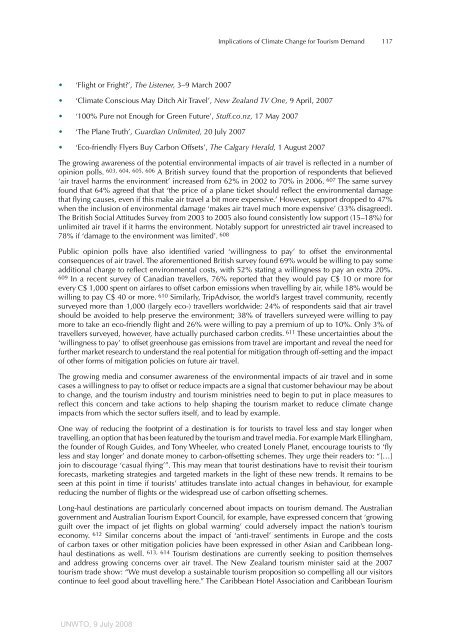Climate Change and Tourism - UNEP - Division of Technology ...
Climate Change and Tourism - UNEP - Division of Technology ...
Climate Change and Tourism - UNEP - Division of Technology ...
Create successful ePaper yourself
Turn your PDF publications into a flip-book with our unique Google optimized e-Paper software.
• ‘Flight or Fright?’, The Listener, 3–9 March 2007<br />
UNWTO, 9 July 2008<br />
Implications <strong>of</strong> <strong>Climate</strong> <strong>Change</strong> for <strong>Tourism</strong> Dem<strong>and</strong><br />
• ‘<strong>Climate</strong> Conscious May Ditch Air Travel’, New Zeal<strong>and</strong> TV One, 9 April, 2007<br />
• ‘100% Pure not Enough for Green Future’, Stuff.co.nz, 17 May 2007<br />
• ‘The Plane Truth’, Guardian Unlimited, 20 July 2007<br />
• ‘Eco-friendly Flyers Buy Carbon Offsets’, The Calgary Herald, 1 August 2007<br />
The growing awareness <strong>of</strong> the potential environmental impacts <strong>of</strong> air travel is reflected in a number <strong>of</strong><br />
opinion polls. 603, 604, 605, 606 A British survey found that the proportion <strong>of</strong> respondents that believed<br />
‘air travel harms the environment’ increased from 62% in 2002 to 70% in 2006. 607 The same survey<br />
found that 64% agreed that that ‘the price <strong>of</strong> a plane ticket should reflect the environmental damage<br />
that flying causes, even if this make air travel a bit more expensive.’ However, support dropped to 47%<br />
when the inclusion <strong>of</strong> environmental damage ‘makes air travel much more expensive’ (33% disagreed).<br />
The British Social Attitudes Survey from 2003 to 2005 also found consistently low support (15–18%) for<br />
unlimited air travel if it harms the environment. Notably support for unrestricted air travel increased to<br />
78% if ‘damage to the environment was limited’. 608<br />
Public opinion polls have also identified varied ‘willingness to pay’ to <strong>of</strong>fset the environmental<br />
consequences <strong>of</strong> air travel. The aforementioned British survey found 69% would be willing to pay some<br />
additional charge to reflect environmental costs, with 52% stating a willingness to pay an extra 20%.<br />
609 In a recent survey <strong>of</strong> Canadian travellers, 76% reported that they would pay C$ 10 or more for<br />
every C$ 1,000 spent on airfares to <strong>of</strong>fset carbon emissions when travelling by air, while 18% would be<br />
willing to pay C$ 40 or more. 610 Similarly, TripAdvisor, the world’s largest travel community, recently<br />
surveyed more than 1,000 (largely eco-) travellers worldwide: 24% <strong>of</strong> respondents said that air travel<br />
should be avoided to help preserve the environment; 38% <strong>of</strong> travellers surveyed were willing to pay<br />
more to take an eco-friendly flight <strong>and</strong> 26% were willing to pay a premium <strong>of</strong> up to 10%. Only 3% <strong>of</strong><br />
travellers surveyed, however, have actually purchased carbon credits. 611 These uncertainties about the<br />
‘willingness to pay’ to <strong>of</strong>fset greenhouse gas emissions from travel are important <strong>and</strong> reveal the need for<br />
further market research to underst<strong>and</strong> the real potential for mitigation through <strong>of</strong>f-setting <strong>and</strong> the impact<br />
<strong>of</strong> other forms <strong>of</strong> mitigation policies on future air travel.<br />
The growing media <strong>and</strong> consumer awareness <strong>of</strong> the environmental impacts <strong>of</strong> air travel <strong>and</strong> in some<br />
cases a willingness to pay to <strong>of</strong>fset or reduce impacts are a signal that customer behaviour may be about<br />
to change, <strong>and</strong> the tourism industry <strong>and</strong> tourism ministries need to begin to put in place measures to<br />
reflect this concern <strong>and</strong> take actions to help shaping the tourism market to reduce climate change<br />
impacts from which the sector suffers itself, <strong>and</strong> to lead by example.<br />
One way <strong>of</strong> reducing the footprint <strong>of</strong> a destination is for tourists to travel less <strong>and</strong> stay longer when<br />
travelling, an option that has been featured by the tourism <strong>and</strong> travel media. For example Mark Ellingham,<br />
the founder <strong>of</strong> Rough Guides, <strong>and</strong> Tony Wheeler, who created Lonely Planet, encourage tourists to ‘fly<br />
less <strong>and</strong> stay longer’ <strong>and</strong> donate money to carbon-<strong>of</strong>fsetting schemes. They urge their readers to: “[…]<br />
join to discourage ‘casual flying’”. This may mean that tourist destinations have to revisit their tourism<br />
forecasts, marketing strategies <strong>and</strong> targeted markets in the light <strong>of</strong> these new trends. It remains to be<br />
seen at this point in time if tourists’ attitudes translate into actual changes in behaviour, for example<br />
reducing the number <strong>of</strong> flights or the widespread use <strong>of</strong> carbon <strong>of</strong>fsetting schemes.<br />
Long-haul destinations are particularly concerned about impacts on tourism dem<strong>and</strong>. The Australian<br />
government <strong>and</strong> Australian <strong>Tourism</strong> Export Council, for example, have expressed concern that ‘growing<br />
guilt over the impact <strong>of</strong> jet flights on global warming’ could adversely impact the nation’s tourism<br />
economy. 612 Similar concerns about the impact <strong>of</strong> ‘anti-travel’ sentiments in Europe <strong>and</strong> the costs<br />
<strong>of</strong> carbon taxes or other mitigation policies have been expressed in other Asian <strong>and</strong> Caribbean longhaul<br />
destinations as well. 613, 614 <strong>Tourism</strong> destinations are currently seeking to position themselves<br />
<strong>and</strong> address growing concerns over air travel. The New Zeal<strong>and</strong> tourism minister said at the 2007<br />
tourism trade show: “We must develop a sustainable tourism proposition so compelling all our visitors<br />
continue to feel good about travelling here.” The Caribbean Hotel Association <strong>and</strong> Caribbean <strong>Tourism</strong><br />
117

















